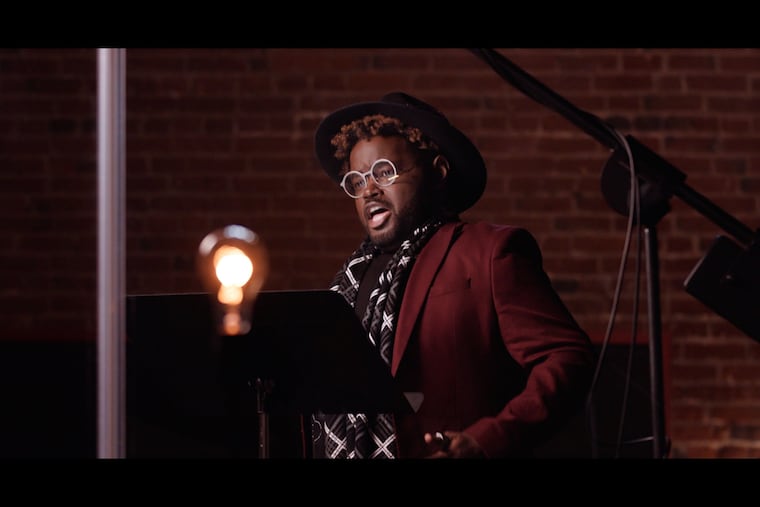Tyshawn Sorey’s ‘Save the Boys’ is a demanding and richly rewarding work. Listen at least twice.
The piece follows nobody’s rules, including its own, and therefore exists constantly in the present tense. It premieres at 8 p.m. Friday on operaphila.tv.

Composer Tyshawn Sorey is in such a dynamic state of creative evolution that one can’t begin to guess what his next piece will be like, or even what the next phrase will do in his new Opera Philadelphia commission, Save the Boys.
This latest work by the composer of Cycles of My Being is short (20 minutes) and unassumingly written for countertenor and piano. But it’s so personal that it becomes challenging to the point where repeated viewing is recommended for this on-demand streaming performance, premiering 8 p.m. Friday on operaphila.tv.
The piece’s title comes from a poem by author and African American women’s rights activist Frances Ellen Watkins Harper (1825-1911), whose influential, art-filled life began in Baltimore and ended at 1006 Bainbridge St. in Philadelphia, where she’d settled after lecturing far and wide as an abolitionist, suffragist, and reformer.
Mainly, she is remembered as a novelist and poet. Her 1887 poem Save the Boys is a confessional lament, told in the first person, by someone broken by alcoholism and pleading that the younger generation somehow be spared that fate.
That’s not source material you’d expect from a cutting-edge composer such as Sorey, but his musical treatment of the poem never looks backward. Neither a song nor aria nor dramatic scene, Save the Boys has the four-stanza poem gradually unfolding in a deliberate stream of music that, on first encounter, feels confoundingly amorphous.
Voice and piano — both spare and with long-sustained notes — seem to travel on separate paths until suddenly the piano writing steps forward with an out-of-left-field flourish of word painting.
The piece follows nobody’s rules, including its own, and therefore exists constantly in the present tense, never allowing listeners to fall back on previous points of reference. In the final stanza, there’s a ghost of traditional melody, but just when the music seems to be heading for a hymn-like cadence, it pulls away, continuing to inhabit its own singular world.
Why this? Why now? Prompted by an increase in murders of Black men and women and galvanized by the past year’s protests against police brutality, Sorey has said his piece reflects “the day-to-day precarity” in which Black Americans continue to live. I also hear in Harper’s century-old poem — unmistakably — the same culture of despair that underlies today’s opioid addiction crisis.
But with music that’s anything but conventional, Save the Boys hasn’t yet found the optimum mode of presentation.
Shot in the soft-lighting living-room atmosphere of Rittenhouse Soundworks in Germantown, the video has pianist Grant Loehnig playing with contemplative spaciousness and countertenor John Holiday (seen in Opera Philadelphia’s 2017 We Shall Not be Moved) singing with scrupulous neutrality. This approach ultimately undercuts the piece. There’s potential universality in Holiday’s rich-tone voice, which could be male or female, but emotional expression is conveyed only selectively.
His face is framed with large, white-rim glasses, hat and scarf — stylish, but frustrating in this era when we long to have a dialogue with unmasked, unobstructed faces. As a result, Holiday’s neutrality often feels impersonal. That approach might normally throw the emphasis onto Harper’s text, though Holiday’s enunciation is that of an opera singer — heavy on nicely-rounded vowels, lighter on consonants, and dedicated to maintaining a clear vocal line — that only touches on the pathos of the poem.
Even the greatest works sometimes need several performances to find their legs. As for now, I suggest giving Save the Boys at least three hearings (it’s short; why not?) and also spending time with the poem, which is printed in full on the Opera Philadelphia website. Project yourself into the mind of the alcoholic protagonist who longs that others will not follow.
The point is to meet Save the Boys more than halfway. It’s worth it.
OPERA
Save the Boys
The Opera Philadelphia film is available on-demand with a season pass starting 8 p.m. Friday through May 31 or as a seven-day rental for $10 at operaphila.tv.